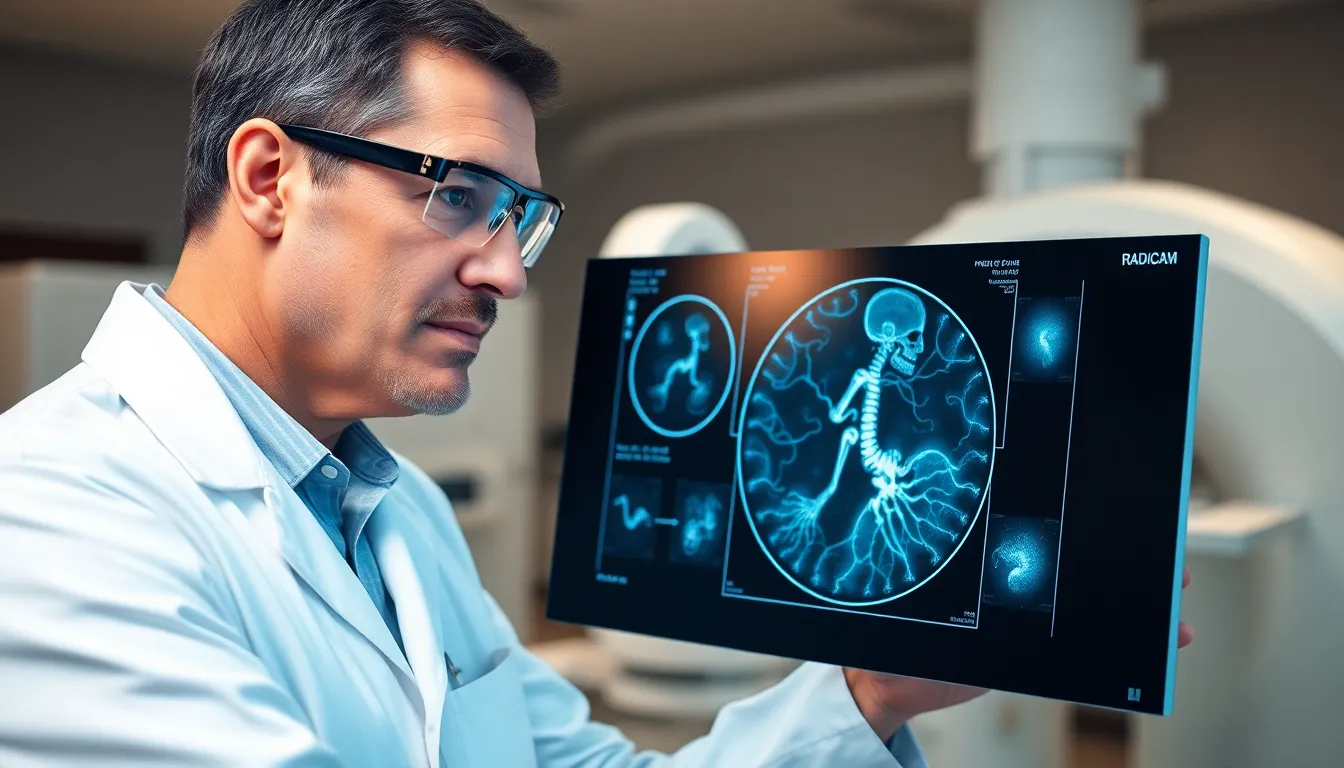Artificial intelligence is shaking up the healthcare world like a toddler with a juice box. From diagnosing diseases faster than a doctor can say “oops,” to personalizing treatment plans that would make even the most stubborn patient nod in agreement, AI is proving to be a game-changer.
Picture a future where machines assist doctors in making decisions, predict patient outcomes, and even manage administrative tasks—allowing healthcare professionals to focus on what they do best: caring for patients. With its ability to analyze vast amounts of data, AI is not just a fancy buzzword; it’s the superhero healthcare has been waiting for.
Table of Contents
ToggleOverview of Artificial Intelligence in Healthcare
Artificial intelligence (AI) signifies a major shift in healthcare capabilities. It streamlines processes and enhances accuracy in medical practices. By analyzing vast quantities of data, AI detects patterns that might elude human observers. In diagnostics, AI systems can outperform traditional methods, identifying diseases earlier.
Healthcare organizations increasingly leverage AI to automate routine tasks. These tasks include scheduling appointments, processing medical records, and managing billing. Efficiency gained through automation allows healthcare professionals to focus on more critical aspects of patient care.
Personalized treatment initiatives thrive with AI’s data analysis capabilities. Tailored therapies based on individual patient profiles improve outcomes significantly. AI algorithms assess genetic information, lifestyle factors, and prior treatment responses to recommend the most effective options.
A notable benefit lies in AI’s ability to support clinicians in decision-making. Machine learning programs evaluate symptoms and suggest potential diagnoses, thus reducing the risk of human error. In emergency situations, rapid assessments enable timely interventions.
Telemedicine platforms utilize AI for enhancing remote consultations. Virtual assistants simulate patient interactions, ensuring clinicians gather essential information efficiently. This technology expands access to healthcare services, particularly for those in underserved areas.
AI-based predictive analytics forecast patient needs, improving resource management. Hospitals can better allocate staff and equipment based on anticipated patient volumes. Furthermore, maintaining optimal stock levels of medical supplies minimizes waste and reduces costs.
Overall, AI is paving the way for a more efficient, responsive healthcare system. Its applications span diagnostics, treatment, administration, and patient engagement. By prioritizing technological advancements, the healthcare industry can meet evolving demands while improving patient outcomes.
Enhanced Diagnostics

Artificial intelligence significantly enhances diagnostic processes in healthcare. Its ability to analyze complex data results in improved patient outcomes.
Improved Accuracy
AI algorithms excel in identifying patterns within medical imaging and patient data. Radiologists utilize these systems to detect anomalies that may remain undetected by the human eye. Studies indicate that AI can improve diagnostic accuracy by up to 30%, particularly in fields such as radiology and pathology. By consistently learning from new data, these tools adapt to emerging medical trends and continually refine their analysis, reducing misdiagnosis rates.
Speed of Diagnosis
AI accelerates the diagnostic process in various medical fields. It processes large datasets at unprecedented speeds, enabling quicker evaluations of lab results and medical images. For instance, AI systems can analyze a chest X-ray in seconds, offering a preliminary diagnosis that supports clinicians in making timely decisions. Faster diagnostics not only enhance patient experiences but also streamline workflows within healthcare facilities, increasing overall efficiency and patient satisfaction.
Personalized Treatment Plans
AI enhances the development of personalized treatment plans, ensuring a more tailored approach for each patient. By leveraging vast data sets, healthcare providers make informed decisions that significantly improve treatment outcomes.
Data-Driven Decisions
Data analytics in AI drives informed decisions, helping providers tailor therapies to individual patient profiles. Genetic information, medical histories, and lifestyle factors combine to create a comprehensive understanding of each patient’s needs. AI algorithms analyze this data to recommend the most effective treatment options. Research indicates that these data-driven methods can lead to a 20% increase in treatment success rates. By examining past responses to therapies, AI also identifies patterns, allowing for adjustments in treatment protocols over time.
Tailored Patient Care
Tailored patient care relies heavily on AI’s ability to assess individual characteristics. Personalized treatment plans consider a patient’s specific health conditions, preferences, and treatment histories. AI algorithms provide insights that help healthcare professionals design targeted interventions for optimal care. This customization often results in improved patient engagement and adherence to treatment plans. Moreover, studies show that personalized approaches can reduce hospital readmissions by up to 15%. Through AI, healthcare shifts toward a more patient-centric model, prioritizing individual needs and fostering better health outcomes.
Administrative Efficiency
AI significantly enhances administrative efficiency in healthcare settings. It automates routine tasks, allowing staff to focus on patient care and critical activities.
Streamlined Workflows
Streamlined workflows emerge as a key benefit of AI integration in healthcare. Scheduling appointments, processing medical records, and managing billing require less manual intervention. By using AI-driven systems, healthcare organizations achieve faster turnaround times. Workflow efficiency leads to improved communication among staff, resulting in better patient experiences. Reducing delays in administrative processes optimizes resource allocation and enhances overall operational effectiveness.
Reduced Administrative Burden
Reduced administrative burden represents another advantage of AI in healthcare. Automation takes over repetitive tasks, simplifying day-to-day operations. With AI handling data entry, records management, and appointment confirmations, employees experience decreased stress levels. AI systems minimize human error while boosting data accuracy and compliance. The resulting increase in efficiency allows healthcare professionals to dedicate more time to direct patient interaction, ultimately improving service quality and satisfaction rates.
Predictive Analytics
Predictive analytics plays a crucial role in AI’s contribution to healthcare. By analyzing large datasets, it enhances disease prediction accuracy and optimizes resource allocation in medical facilities.
Disease Prediction
Disease prediction models powered by AI analyze patient data and identify potential risk factors. Machine learning algorithms examine symptoms, genetic predispositions, and lifestyle choices to uncover trends indicating future health issues. For instance, predictive analytics can identify a patient’s likelihood of developing chronic conditions such as diabetes or heart disease. This enables healthcare providers to implement early preventive measures. Studies suggest that these models can reduce disease incidence by up to 25%. Improved early detection not only saves lives but also lowers treatment costs by managing conditions before they escalate.
Resource Allocation
Efficient resource allocation benefits significantly from predictive analytics in healthcare settings. AI technologies predict patient flows and demand patterns based on historical data and current trends. Hospitals can forecast peak times for admissions and allocate staff and equipment accordingly. This proactive approach minimizes overcrowding and reduces wait times for patients. Research indicates that accurate resource allocation can decrease operational costs by up to 20%. By effectively managing resources, healthcare facilities enhance service quality while simultaneously boosting staff satisfaction, resulting in a more effective healthcare environment.
Patient Engagement and Experience
Artificial intelligence significantly enhances patient engagement and experience in healthcare. By employing various technologies, healthcare providers can create a more interactive and responsive environment.
Virtual Health Assistants
Virtual health assistants provide real-time responses to patient inquiries. These tools assist in symptom checking, appointment scheduling, and medication management. Increased accessibility through chatbots empowers patients to seek information whenever necessary. Patients can receive timely responses, leading to heightened satisfaction. Studies show virtual assistants decrease wait times by up to 50%, ensuring patients access support efficiently.
Improved Communication
AI improves communication between patients and healthcare providers. Automated reminders for appointments and medications enhance patient adherence to care plans. Additionally, these systems facilitate secure messaging, allowing seamless interaction regarding treatment plans. Enhanced communication reduces misunderstandings, fostering a stronger patient-provider relationship. Research highlights a 30% increase in patient engagement levels due to improved communication strategies driven by AI technologies. Continuous updates and feedback loops further ensure patients feel valued and involved in their care journey.
Research and Development
Artificial intelligence significantly accelerates research and development in healthcare. It enhances the entire process from drug discovery to clinical trials.
Drug Discovery
AI transforms drug discovery by streamlining the analysis of chemical compounds. Researchers utilize machine learning algorithms to predict how new drugs will interact with biological systems. This capability reduces the time required for identifying potential candidates by up to 50%. Moreover, AI enables virtual screening of libraries containing millions of compounds, pinpointing those likely to succeed in clinical applications sooner. It also allows scientists to customize molecules based on their specific interactions, optimizing effectiveness and safety. Consequently, pharmaceutical companies increasingly rely on AI-driven analyses, resulting in more innovative solutions for treating diseases.
Clinical Trials
AI improves clinical trial design and patient recruitment. By analyzing vast datasets, it identifies suitable candidates, ensuring diversity and adherence to study criteria. This can reduce recruitment time by up to 30%. AI also facilitates patient monitoring through wearables, enabling real-time data collection that enhances safety and efficacy assessments. Additionally, predictive analytics helps in designing adaptive trial protocols, allowing modifications based on interim results. This flexibility increases the trials’ likelihood of success and accelerates bringing new therapies to market. As a result, AI plays a crucial role in optimizing the clinical trial process, ultimately saving time and resources in drug development.
Artificial intelligence is reshaping healthcare in profound ways. By enhancing diagnostic accuracy and personalizing treatment, it empowers healthcare providers to deliver better patient outcomes. The automation of administrative tasks not only streamlines operations but also allows professionals to focus on what truly matters—patient care.
AI’s predictive analytics capabilities improve resource allocation and disease prevention, making healthcare more efficient and accessible. With virtual assistants and telemedicine, patient engagement reaches new heights, fostering stronger connections between providers and patients. As AI continues to evolve, its potential to revolutionize healthcare remains immense, paving the way for a more effective and responsive system that prioritizes patient needs.









